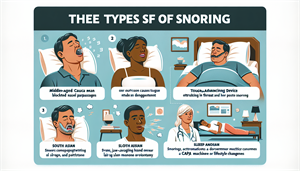
What Are The Three Types Of Snoring?
Are you curious about the different sounds of snoring each night? The key to quieting them starts with understanding “what are the three types of snoring”: 1) nose-based, 2) mouth-based, and 3) tongue-based. This article will help you identify which type of snoring is keeping you awake, with insights into their unique causes and how to address them.
Key Takeaways
Snoring is categorized into three primary types: nose-based (caused by blockages in nasal passages), mouth-based (resulting from airway tissue vibration due to mouth breathing), and tongue-based (where the relaxed tongue obstructs airflow). Individual snoring types can be identified by evaluating one’s sleep positions, listening to snore sounds, and considering factors like alcohol or medication use, as they can relax throat muscles and worsen snoring.
Preventative and intervention strategies for snoring include lifestyle changes such as weight management and quitting smoking, adopting sleep position adjustments, and in severe cases, seeking professional help and considering surgeries or CPAP therapy.
Unraveling the Mysteries of Snoring: A Closer Look
At its core, snoring is a physical process. It’s the sound we make when air flows past relaxed tissues in the upper airway, causing these tissues to vibrate as we breathe. But not all snoring is created equal.
There are three primary categories of snoring, each with its unique causes and characteristics: nose-based, mouth-based, and tongue-based snoring.
Discerning the different types of snoring plays a significant role in pinpointing the most effective solutions. For instance, nose-based snoring could be related to blocked nasal passages, while mouth-based and tongue-based snoring may involve different parts of the throat and mouth. We’ll examine each type in greater detail.
Nose-Based Snoring: The Nasal Passage Conundrum
Nasal snoring occurs when there are blockages in the nasal passages. This type of snoring, also known as nose-based snoring, can be caused by allergies, sinus infections, nasal polyps, or a deviated septum, all of which disrupt airflow and lead to snoring. Fortunately, there are several interventions available to tackle nose-based snoring. Some potential solutions for those struggling with nasal snoring include: Managing allergies, using nasal dilator strips or nasal rinses, quitting smoking, and surgery. These interventions can help alleviate nasal snoring, especially for those suffering from pet and dust allergies.
Mouth-Based Harmony: When the Oral Pathway Vibrates
Mouth-based snoring occurs when the muscles and tissues in the mouth vibrate during sleep. It’s typically caused by inhaling air through the mouth due to a potential blockage in the nose. Thankfully, treating mouth-based snoring can be straightforward with the right interventions. From using chin-up straps to specialized adhesive tape designed for mouth snoring, to even adjusting the sleeping position, there are several ways to tackle this type of snoring.
The Tongue's Tale: A Silent Blockade
Last but not least, we have tongue-based snoring and throat based snoring. Snoring occurs when the relaxed tongue obstructs the airflow into the lungs, particularly when in a supine position. Tongue snorers are often seen in individuals who consume alcohol, have excess neck fat, or sleep on their backs. Treatment includes using a mouth-guard while sleeping or devices designed to discourage sleeping on the back. These measures maintain an unobstructed airway by preventing the tongue and other soft tissues from blocking it.
Identifying Your Snoring Type: Key Indicators
Identifying your snoring type is like putting together pieces of a puzzle. It’s a matter of observing your sleep positions, listening to the sounds you make, and noting potential triggers like alcohol or medication.

